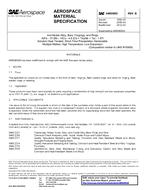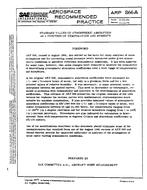Vehicle electrical/electronic systems may be affected when immersed in an electromagnetic field generated by sources such as radio and TV broadcast stations, radar and communication sites, mobile transmitters, cellular phones, etc. This part of SAE J551 specifies off-vehicle radiated source test methods and procedures for testing passenger cars and commercial vehicles within a Reverberation Chamber. The method is used to evaluate the immunity of vehicle mounted electronic devices in the frequency range of 80 MHz to 2 GHz, with possible extensions 20 MHz to 10 GHz, depending upon chamber size and construction. Three methods for calibrating and applying electromagnetic fields are described in the document: 1) Mode Tuned Reverberation Chamber method, 2) Mode Stir (Standard) Reverberation Chamber method and 3) Mode Stir (Hybrid) Reverberation Chamber method. Optional pulse modulation testing at HIRF (High Intensity Radiated Fields) test levels, based upon currently known environmental threats, has been included in this revision of the standard. Each method has its advantages and disadvantages which are discussed in each individual test section. All methods have been proven to be effective at finding potential field issues at the vehicle level. SAE J551-1 specifies general definitions, practical use, and basic principles of the test procedure. Specific chamber characterization procedures, formulas and calibration procedures for the Mode Tuned and Mode Stir (Standard) methods can be found in SAE J1113-28 and J1113-27 respectively. Chamber characterization procedures for the Mode Stir (Hybrid) method are described in 6.3 of this document.
Product Details
- Published:
- 05/01/2012
- File Size:
- 1 file , 240 KB


